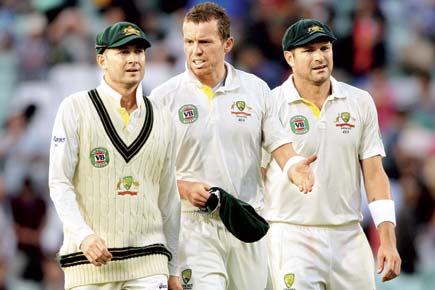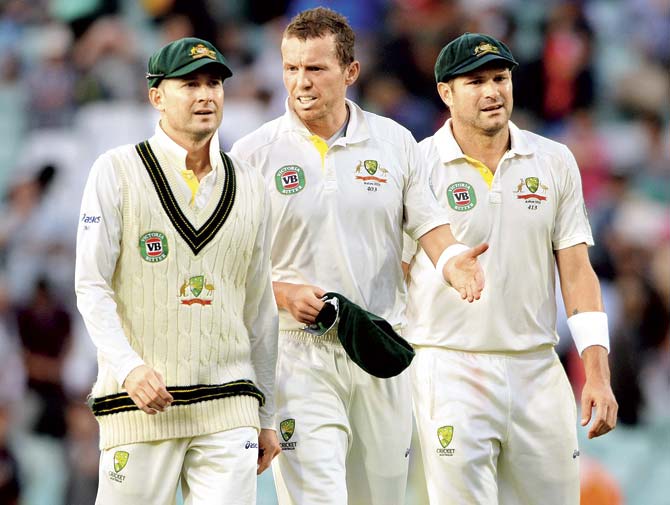When the West Indies arrived in Australia for the 1979-80 tour, their first Test series Down Under after 1975-76 (the one in which they got a 5-1 shellacking), they were constantly reminded of that loss through the media

 When the West Indies arrived in Australia for the 1979-80 tour, their first Test series Down Under after 1975-76 (the one in which they got a 5-1 shellacking), they were constantly reminded of that loss through the media. This, despite being a highly successful team in Kerry Packer’s World Series Cricket.
When the West Indies arrived in Australia for the 1979-80 tour, their first Test series Down Under after 1975-76 (the one in which they got a 5-1 shellacking), they were constantly reminded of that loss through the media. This, despite being a highly successful team in Kerry Packer’s World Series Cricket.
ADVERTISEMENT
Footage was often shown of how Dennis Lillee, Jeff Thomson and Gary Gilmour destroyed their batting line-up while the Chappell brothers Ian and Greg, along with Ian Redpath, tore apart their Andy Roberts-led bowling attack in 1975-76.

In this file photo, Australian fast bowler Peter Siddle (centre) appears frustrated as he walks off the field with captain Michael Clarke (left) and fellow pacer Ryan Harris during the Oval Test against England in London on August 22, 2013. Pic/Getty Images
Like they had to do in 1976, when Tony Greig made his famous “grovel” comment, Clive Lloyd’s West Indians had to bear it. But like in 1976, his 1979-80 team ended up grinning and winning.
Australia is number one when it comes to vigorous build-ups, especially when they hold the aces for the next battle.
The 2015 Ashes is not far away and the utterances have begun. Steven Smith, Australia’s vice-captain has already been quoted as saying that England “won’t come close” to beating them this summer. Skipper Michael Clarke tried to be balanced in his view on the Kevin Pietersen controversy recently, and he did. But he ended up being headlined for his view on how England is weaker without Kevin Pietersen.
Clarke put his Ashes task at hand in true perspective: “Playing away from home is your greatest challenge as an international sporting team and England will be tough (because) they know their conditions well.”
However, not much is being said about Australia’s inability to clinch an Ashes series in England since 2001. That’s 14 years ago! Just imagine how often, and hard, the Australian media would have ridiculed another team, which had not won against Australia in three series. For the record, Australia failed to clinch the Ashes urn in 2005, 2009 and 2013. That Australia’s last series win in England was experienced as long ago as the Steve Waugh era is a blot on their so-called formidability.
Coach Darren Lehmann got a double scoop of credit for Australia’s 5-0 win in the last Ashes held in Australia in 2013-14, but it’s probably warped to overly credit him for being the mastermind. Point is, Australia had the right kind of ammunition to fire and, thanks to Pietersen’s book, we now know more about what was happening in the England camp.
History tells us that Australia have lost in England despite having quality sides. The 2005 Ashes is a prime example.
Andrew Strauss, England’s new Director of Cricket, and one of the batting stars in the summer of 2005, revealed in his autobiography how an accidental, after-golf conversation with then New Zealand captain Stephen Fleming, after Australia won the first Test at Lord’s by 239 runs, helped him to believe that the all-conquering Australians could be beaten because the English bowlers had “ruffled” some “out of nick” Australian batsmen.
“From that point on,” Strauss wrote, “I felt a renewed sense of purpose as I prepared myself for the second Test match.” Strauss scored 393 runs in the series, inclusive of two centuries.
Australia’s 2009 loss after the 5-0 win in 2006-07 was understandable because they no longer had retirees Shane Warne, Glenn McGrath, Matthew Hayden and Adam Gilchrist, but what happened in 1981 was baffling. Just the previous year, Australia had whipped their traditional rivals 3-0 in a series for which the Ashes were not at stake because it was only a three-Test affair.
With only Greg Chappell not touring due to family and business reasons, the 1981 Australian tourists had Dennis Lillee, Rod Marsh, Kim Hughes (captain) and Allan Border. But an England side led by the astute Mike Brearley and inspired by the exploits of a certain Ian Terence Botham thrashed them. England didn’t look back after the Botham-Willis show in the third Test at Headingley. Marsh said Australia, “should have won that series… no risk! We didn’t win the series and it was disappointing. It was tragic, really.”
Strauss is now viewed as a villain for virtually telling Pietersen that he has no future with England because of the England and Wales Cricket Board’s lack of trust with him. It’s almost as if Strauss was the gunman, ordered to shoot, and then the general (ECB chairman Colin Graves) steps in to justify the act after Pietersen brought up a conversation he had with Graves about his future.
For a batsman of Pietersen’s calibre and contribution, things could have been handled less brutally.
It’s move-on time. For England and Pietersen!
Clayton Murzello is mid-day’s Group Sports Editor
 Subscribe today by clicking the link and stay updated with the latest news!" Click here!
Subscribe today by clicking the link and stay updated with the latest news!" Click here!







